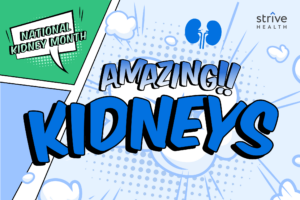Intimacy and Sex with Chronic Kidney Disease
Author : Kimberly Ryan, LCSWWith the sea of flowers, heart-shaped candies, and oversized teddy bears flooding the aisles of the stores, romance is in the air. While some embrace the love bug, those struggling with their health can feel additional pressures in their relationships and expression of sexuality. According to the National Kidney Foundation, “many people think that sexuality only refers to intercourse, but sexuality includes many things such as touching, hugging, or kissing. It includes how you feel about yourself, how well you communicate, and how willing you are to be close to someone else.”
There are many things that can impact your sexuality and sense of self if you have kidney disease, such as your hormones, medications, emotions, appointment and treatment regimen and overall energy levels. It is not uncommon for people with kidney disease to struggle with sex or experiencing the desire to engage in sex. While medication treatment options to assist this are available through discussion with your care team, many patients avoid these personal conversations in a health care setting and would prefer strategies that can be done at home without additional medications. So how can sexual desire and satisfaction be managed in the home? The National Institutes of Health reports higher levels of intimacy are associated with higher sexual desire, which is, in turn, associated with higher odds for partnered sexual activity to occur.
What is intimacy?
According to the Oxford Dictionary, intimacy can be close relationships like family or friends; a cozy, private or relaxed atmosphere; or sexual intercourse. Intimacy is not limited to physical expressions of desire or sexual intercourse, but it can enhance them. There are four different types of intimacy: physical, emotional, mental and spiritual. We will focus on the impact of physical and emotional intimacy and sexual desire and satisfaction.
Physical intimacy can be explained as how you express care and desire through touch (including subtle caresses, hugging, kissing, cuddling, foreplay and sexual intercourse). Emotional intimacy can be described as how you and your partner attend to one another’s emotional needs and interests, like limiting distractions and engaging in an enjoyed activity together. Being intentional with these forms of intimacy can assist in naturally boosting oxytocin, fondly referred to as the “love hormone,” in the brain for both partners, leading to an increase in the likelihood for sexual desire and satisfaction to occur.
Where can I start?
Increasing intimacy in your relationship can begin with simple changes in your interactions. Emotional intimacy is associated with the feeling of sharing and connecting with a partner on a deeper level. Emotional intimacy can be increased with your partner by spending quality time with one another, supporting them in their struggles or increasing how often you notice and communicate your appreciation of things they do. To start, you can set goals around these areas by building simple connection rituals into your routine like:
- going for after-dinner walks together
- cooking breakfasts on Sundays together
- asking and expressing genuine care about one another’s day
- challenging yourself to tell your partner three things they do each week that you appreciate.
These rituals can help make physical intimacy more natural. Besides sexual intercourse, physical intimacy can be increased through gentle touches, longer embraces, kissing and cuddling.
When to talk to your doctor
Caring for a patient involves caring for the entire person. The impact of your kidney disease on your expression of sexuality is a conversation worth having for both your physical and mental health when you are comfortable and ready. This conversation becomes increasingly important if you find that you are experiencing continued lack of interest, unexplained bleeding, discomfort, difficulties climaxing, difficulties maintaining an erection, or mental health factors that cause difficulties in feeling connected intimately with your partner. Medications and treatments received as part of your kidney care can impact other parts of your body and mind and may require medical attention. It is both normal and healthy for you to want to feel satisfied in your expression of intimacy and sexuality and bring the enjoyment back into this part of your life and relationship.






